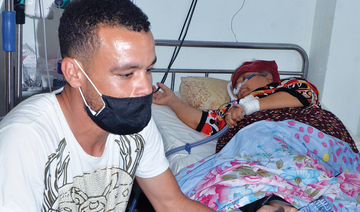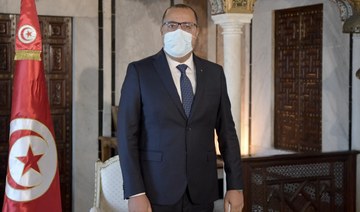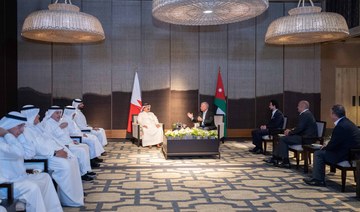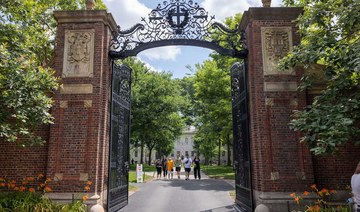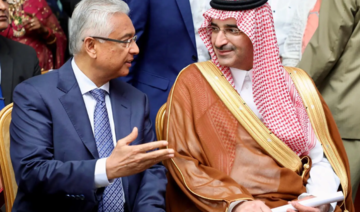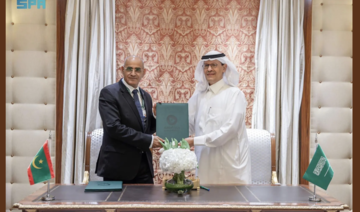TUNIS: At least 43 people were missing off the southeastern coast of Tunisia after a boat carrying more than 120 migrants sank, the Tunisian Red Crescent said on Saturday.
“Eighty-four migrants were rescued and 43 others disappeared after a boat carrying 127 migrants sank off the coast of Zarzis” on Friday night, Mongi Slim of the Red Crescent told AFP.
The vessel had set off from Libya’s coast, he added, citing the accounts of survivors.
The Tunisian navy rescued “84 illegal migrants of various nationalities” including from Bangladesh, Chad, Egypt, Eritrea and Sudan, the defense ministry said.
The survivors picked up off Zarzis were aged between three and 40, the ministry said, without giving any number for those missing.
It said that the boat had departed the port of Zuwara, in northwestern Libya during the night between Monday and Tuesday.
43 missing off Tunisia after migrant boat sinks: Red Crescent
https://arab.news/6jsx4
43 missing off Tunisia after migrant boat sinks: Red Crescent
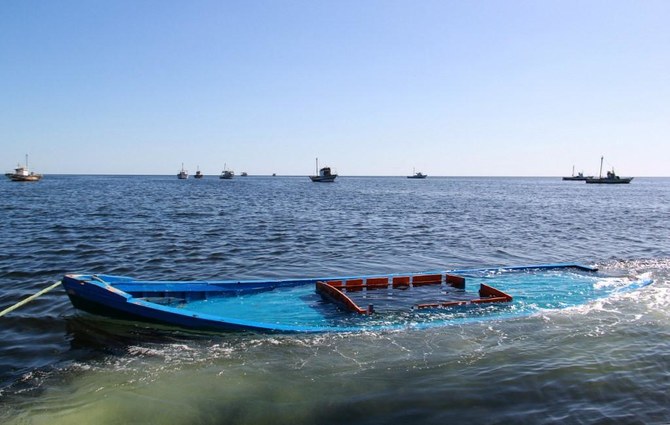
- The Tunisian navy rescued “84 illegal migrants of various nationalities”
- The survivors picked up off Zarzis were aged between three and 40, the ministry said
Bahraini investments in Jordan reach more than $1bn

- Jordanian exports to Bahrain increased to JD47.9 million in 2023
AMMAN: Bahraini investments in Jordan now total about $1.2 billion, according to a recent report by the Amman Chamber of Commerce.
As of the end of April, Bahrain was ranked fourth among foreign investors on the Amman Stock Exchange, Jordan News Agency reported.
While trade between Jordan and Bahrain experienced a slight downturn in 2023, totaling JD92 million ($129 million) compared with JD136 million in 2022, Jordanian exports to Bahrain increased modestly from JD45.9 million to JD47.9 million.
However, Bahraini exports to Jordan dropped significantly from JD90.1 million to JD44.3 million during the same period.
In the first two months of 2024, bilateral trade amounted to JD10.6 million, comprising JD5.8 million in exports and JD4.8 million in imports.
Bahrain and Jordan have signed several cooperation agreements in various sectors to bolster trade exchange, establish free trade zones, form joint business councils, and facilitate collaboration between entities such as the Bahrain Chamber of Commerce and Industry, the Federation of Jordanian Chambers of Commerce, and the Amman Chamber of Industry.
In addition, measures have been implemented to combat tax evasion through agreements on double taxation avoidance concerning capital taxes.
As of May 4, the ACC has registered 24 Bahraini partners with a collective stake of approximately JD553 million.
Among these, 12 partners operate in the services and consulting sector, holding a stake of JD392 million, while five are involved in the communications and information technology sector, with a total stake of JD54 million.
Three partners are engaged in the financial and banking sector (JD18 million), one in construction and building materials (JD79 million), one in the food sector (JD5 million), one in furniture (JD6 million), and one in health and pharmaceuticals (JD50,000).
In February 2023, Jordan, the UAE, Egypt and Bahrain signed 12 agreements during the third meeting of the Higher Committee for the Integrated Industrial Partnership for Sustainable Economic Development.
These agreements, collectively valued at approximately $2 billion, encompass sectors including agriculture, medicine, metals, chemicals, electric vehicles and waste management.
The committee unveiled nine comprehensive industrial projects, with investment exceeding $2 billion, with the objective of enhancing domestic production in partner countries by more than $1.6 billion.
These projects are expected to generate approximately 13,000 direct and indirect employment opportunities in the four countries.
Future of relations between Japan and Middle East in the spotlight at event in Amman

- Topics at conference include economic and regional integration, formulation of security policies
- Experts, decision-makers discuss the challenges extremism pose to Japanese interests in the region
AMMAN: Delegates at the inaugural Japan-Middle East Strategic Dialogue Conference, which concluded on Monday in Amman, discussed the future of Japan’s relations with countries in the region.
Specific topics covered during the two-day event, which was organized by the Center for Strategic Studies at the University of Jordan and the Research Center for Advanced Science and Technology at the University of Tokyo, included economic and regional integration, the development and transfer of technology, and the formulation of security policies, the Jordan Times reported.
The participants included experts and decision-makers from across the Middle East and Japan, who discussed the challenges extremism and terrorism pose to Japanese interests in the Middle East, and the significant effects they have on the behavior of non-state actors and regional stability.
They also highlighted notable investments by Japan in the burgeoning entrepreneurship sector in the Middle East, particularly in small and medium enterprises, and the nation’s promising ventures in the development of energy infrastructure in the region.
During the opening ceremony on Sunday, Nazir Obeidat, president of the University of Jordan, said the conference can play a significant role as a cornerstone of Jordanian-Japanese relations, which have been characterized over the years by mutual respect and stability.
He highlighted the exceptional nature of a bilateral relationship he said is underpinned by a shared philosophy, its diverse components, and effective mechanisms for the implementation of agreements. He also underscored Jordan’s growing belief in the pivotal role that education, research, innovation and creativity can play in fostering genuine development, economic prosperity and sustainability.
Obeidat expressed his hope that Japan can help Jordan foster an environment conducive to scientific advancement and the building of partnerships between academia and industry, and affirmed his university’s commitment to this.
The Japanese ambassador to Jordan, Okuyama Jiro, noted that this year marks the 70th anniversary of Jordanian-Japanese diplomatic relations, and the 50th anniversary of the establishment of the Japan International Cooperation Agency office in Jordan.
He reiterated that Japan views Jordan as a strategic ally, in recognition of the nation’s pivotal role as a regional hub and gateway to the Middle East, with significant ties to Africa.
The envoy also acknowledged Jordan’s resilience in its efforts to confront economic challenges and refugee crises while maintaining security and stability, and praised authorities in the country for their exemplary approach to addressing multifaceted issues.
Gulf Creatives Conference goes ahead despite nearby protest encampment

- Conference included 24 discussion sessions and five workshops covering topics such as public policy, innovation strategies, and the future of healthcare
- KFSH&RC CEO Dr. Majid Ibrahim Al-Fayyadh spoke of the emergence of a leading healthcare sector in the region after a decades-long transformation plan
CAMBRIDGE: The second edition of the Gulf Creatives Conference took place at Harvard University at the weekend, despite pro-Palestine protests on the campus.
“Amid the rising tensions on US college campuses, we believe firmly in the power of creativity and the arts in healing wounds and bridging divides,” Abdulla Almarzooqi, chairperson of the organization’s UAE Committee and a graduate student at Harvard, told Arab News in an interview.
The event attracted over 1,000 attendees and more than 170 speakers, among whom was Gulf Co-operation Council Secretary-General Jasem Al-Budaiwi. He took to the stage to address Gulf students and outline the region’s vision to lessen reliance on oil revenues by embracing diverse sectoral reforms.
“The strategic location, coupled with robust infrastructure, paves the way for the council member states to attract international partnerships that support their long-term development goals,” Al-Budaiwi said.
He added: “This dynamic approach is vital for sustaining economic growth and ensuring the resilience of Gulf economies in the face of global economic fluctuations and regional challenges.”
He also praised students for hosting such an event at one of the world’s most prestigious universities.
The conference included 24 discussion sessions and five workshops covering topics such as public policy, innovation strategies, and the future of healthcare.
Among the main speakers on healthcare was Dr. Majid Ibrahim Al-Fayyadh, CEO of the King Faisal Specialist Hospital and Research Center, who spoke of the emergence of a leading healthcare sector in the region after a decades-long transformation plan.
“The Saudi leadership has a clear vision for KFSH&RC, which was crowned by royal order to transform it into an independent institution of a private, nonprofit nature,” he said.
The transformation includes enhancing existing services and exploring new medical trends to improve health and well-being, he added.
Other panelists included Maryam Bin Theneya, second deputy speaker at the Federal National Council of the UAE, Bader Al-Attar of the Kuwait Petroleum Corporation, and Saudi Media Company’s Khalid Al-Khudair.
UAE, Mauritius sign MoU to boost energy cooperation

- Two sides will exchange expertise and information on emerging technologies, best practices and knowledge-sharing
DUBAI: The Emirati Ministry of Energy and Infrastructure and the Mauritian Ministry of Energy and Public Utilities inked a memorandum of understanding on Monday aimed at bolstering collaboration across water, energy and sanitation sectors, Emirates News Agency reported.
The agreement outlines a broad spectrum of cooperation, encompassing energy, renewable energy, hydrogen and its derivatives, energy efficiency, liquefied natural gas and water management.
Also under the agreement, cooperation will also take place in the water efficiency, desalination, digital technology applications, wastewater treatment and sanitation sectors.
Under the MoU, the two sides will exchange expertise and information on emerging technologies, best practices and knowledge-sharing.
They will also explore joint research and development initiatives and implement projects using public-private partnership and independent power producer models.
The agreement also facilitates joint visits, meetings and technical workshops, while encouraging bilateral investment in relevant sectors.
“This MoU cements the longstanding relations between the UAE and Mauritius and serves their shared commitment to sustainable development and environmental protection. The UAE follows a collaborative approach to meet the targets of the UAE Energy Strategy 2050, the National Hydrogen Strategy 2050, and the UAE Water Security Strategy 2036, which collectively contribute to the UAE’s net zero by 2050 target,” said Suhail bin Mohammed Al-Mazrouei, Emirati minister of energy and infrastructure.
Georges Pierre Lesjongard, Mauritian minister of energy and public utilities, thanked the UAE for the longstanding collaboration between the the emirates and Mauritius in various sectors.
He said that the cooperation played a pivotal role in advancing Mauritius’s goals outlined in its nationally determined contributions and in enhancing resilience against the impacts of climate change, particularly for Mauritius as a small island developing state.
Doctors treat Sharjah school teacher with rare nerve disease

DUBAI: Doctors in a Sharjah hospital helped a 46-year-old resident undergo treatment for a debilitating nerve disease that prevented her from walking.
Annie Cherian, a school teacher from India and living in Sharjah, experienced weakness in her limbs six months ago and her condition quickly worsened, making daily life tasks like brushing her hair or even walking increasingly difficult.
On April 3 Cherian sought help from doctors at Aster Hospitals in Sharjah and within two days received a CIDP diagnosis, a condition that affects approximately 1-2 people in 100,000 annually according to the CIDP Foundation International.
CIDP, or Chronic Inflammatory Demyelinating Polyneuropathy, is a rare autoimmune nerve disease that attacks the covering of the nerve cells and leads to loss of physical strength and sensation in the arms and legs. It can be caused by a virus or infection that enters the body.
Usually CIDP is treated with steroids, but as Cherian is also a diabetic, this option was not viable as it might worsen her diabetes, explained Dr. Rajesh Chaudhary, specialist neurologist at Aster Hospital Sharjah.
With the help of Chaudhary and his medical team, Cherian underwent an intravenous treatment which lasted five days.
The treatment involved introducing antibodies through the vein, which helps existing antibodies in the body to strengthen and fight off infections and diseases, Chaudhary explained.
“Without proper treatment, a patient’s quality of life becomes very poor and they struggle to do mundane everyday tasks,” said Chaudhary.
Other symptoms of CIDP include problems walking, lack of strength, tingling and pain in the limbs, he said.
Cherian responded well to the treatment and regained strength in her limbs, and is now able to perform everyday tasks unassisted.
Chaudhary said Cherian is expected to lead a normal life after the treatment and will most likely not experience weakness or fatigue in her limbs again.
“I am so grateful for the medical team who helped me recover remarkably and restore my strength, but also made me aware of autoimmune disease’s impact and the importance of timely medical intervention,” said Cherian.



